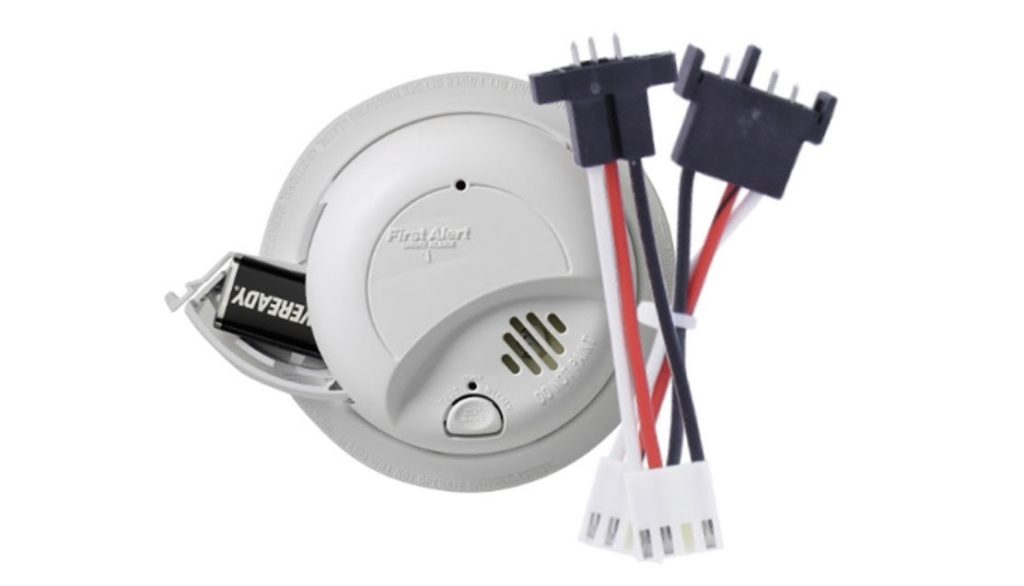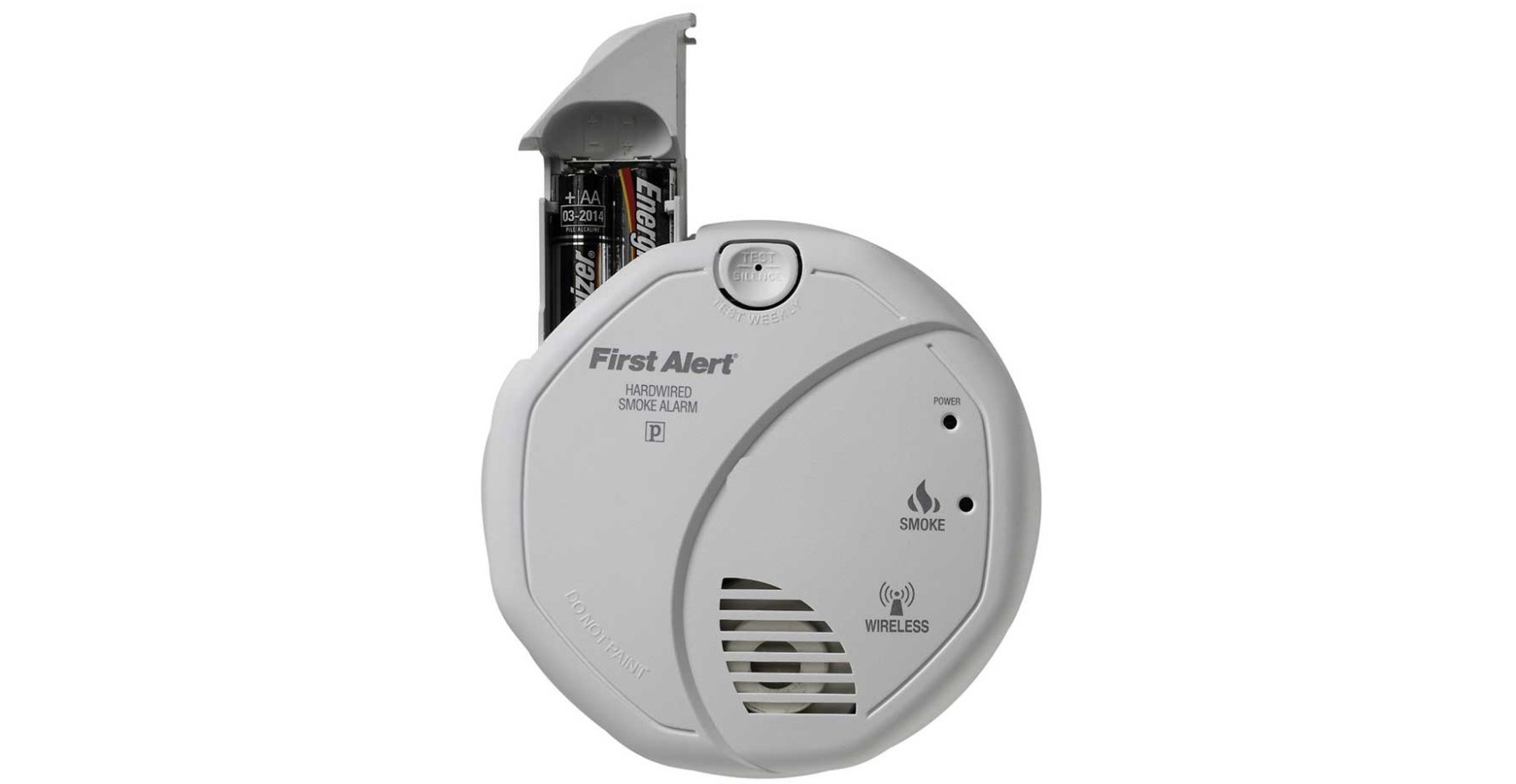The first thing to do when your smoke detector goes off is to get to safety. It’s always a huge relief when you realize it’s a false alarm. But, that’s until you find yourself struggling to turn off the alarm. This can be frustrating when you don’t know anything about smoke detectors.
You could easily call a technician to fix the issue but that would mean you put up with the alarm until they show up and incur extra costs.
So, to save yourself from the two, how about learning to stop a hardwired smoke detector from beeping after a false alarm?
How smoke detectors work
There are different systems of smoke detectors:
- Ionization smoke detectors: These have two plates with an electric charge flowing between them. So, when something foreign like smoke passes between the plates, the electric charge is interrupted, and the alarm goes off.
- Photoelectric smoke detectors: These have a light that would bounce off anything that enters the detector, then refracts onto a sensor thus triggering the alarm.
- Dual Alarms: These smoke detectors have both electric charge and light sensors. Depending on the model, one or both sensors must be triggered for the alarm to go off.
- Smart Smoke Detectors: These smoke alarms have a smart system that allows you to link them with your smartphone. You can control them remotely. Plus, the system will let you know about different errors and issues like when you need to change the batteries.
You can group the detectors further depending on their power source. These are:
- DC models: These use either replaceable batteries or long-life lithium batteries.
- AC models: These detectors use electrical hardwiring and are fitted with batteries as a backup.
Why does my wired-in smoke detector keep going off?
Now, here are some of the reasons why your smoke detector keeps going off.
1. Foreign objects
For both the ionization and photoelectric smoke detector systems, the alarms are triggered when a foreign object enters the unit.
So, the false alarm can be a result of steam, vapor, dust, or insects finding their way inside the smoke detector.
2. Electrical issues and batteries

Electrical issues like a change in the electrical current to the wired smoke detector will trigger a false alarm. Also, when the electricity is cut off or you have a loose wire in the smoke detector, the alarm will go off.
For the DC models, low batteries could easily cause the smoke detector to go off. You should make sure the batteries are installed properly.
3. Location
Where you install your smoke detector matters a lot. If you put it close to the kitchen or bathroom then expect frequent triggers resulting from steam that’s produced when cooking or taking a hot shower.
Additionally, when you set up near a ventilation system, there’ll be alarm triggers caused by dust and debris entering the system.
4. Too many errors
If your smart smoke alarm won’t stop going off, chances are that there are too many errors saved on the processor.
You need to find a way to reset it and clear its memory.
5. Bad Installation
The other reason your hardwired smoke alarm keeps going off at night is improper installation.
It could be that the interconnect wire is grounded, or one of the hardwired smoke detectors is incompatible, among other issues.
6. The smoke detector may be old
The lifespan of most smoke detectors is 10 years. Once they clock that number, some components start to fail or are not as effective as before, hence the false alarm triggers.
To be sure about the age of your smoke alarm, check the manufacture date printed on the back of the unit.
Read Also: The Inkbird Wireless Meat Thermometer IBT-2X review
How to turn off your smoke detector and prevent it from going off
Once you realize that the overbearing sound from your smoke signal is a false alarm, there are a few things you can do to turn it off and prevent other false triggers in the future.
These include:
1. Cut the power source and replace the batteries
First, you need to disconnect the alarm from its power source.
- For the standalone (DC) model smoke alarm, you’ll remove the batteries then press and hold the silence button for 10-15 seconds to stop the beeping. Later, install new batteries and you’re good to go. Always change the batteries at least once every 6 months.
- For the hardwired (AC) model smoke alarms, you must turn off the circuit breaker controlling the alarm’s electricity or remove them from the power source. Secondly, remove the backup batteries. Next, press and hold the silence button for 20 seconds or until the alarm stops beeping. Lastly, install new batteries, reconnect to the electrical circuit and switch on the circuit breaker.
- Those with smart smoke detectors can simply turn them off using an app on their phones.
NOTE: Unfortunately, the long-life Lithium batteries can’t be removed. If your alarm uses these batteries, you’ll have to use any of the other methods to stop it.
2. Reset your smoke detector
Look for the red reset button and press and hold it for 15-20 seconds. Those with hardwired smoke detectors will have to press the button of each unit because it’s hard to tell which one started the problem.
On the other hand, a simple restart will fix the errors on your smart smoke detector. Remove the batteries and put them back or flip the circuit breaker off then back on.
3. Clean the smoke detector
Get a vacuum attachment or canned air and clean off any dust and debris from the smoke detector. This will help to turn it off and prevent future triggers.
4. Strategic installation
The best way to prevent the smoke detector from going off when smoking is to install them strategically around the home.
To start with, make sure they are a good distance from the kitchen and bathroom so that smoke and steam don’t trigger them easily.
5. Check the connection
Look for simple issues in the connection and fix them. If they’re too complex, then call a certified technician to help you out. You can start with the wiring. Next, unplug one hardwired smoke detector after the other to determine the one with the problem and stop it.
Make sure you follow the right guidelines when connecting your smoke alarm(s).
6. Replace the smoke detector
If after trying all the solutions above, your hardwired smoke alarm keeps going off at night, you should start shopping for a new device.
Your current detector could be too old to function properly.
Conclusion
Having a smoke detector that works is important for your safety and peace of mind. We hope our troubleshooting guide above helps you to solve false alarm problems. If you can’t stop the hardwired smoke detector, reach out to a qualified technician. Be sure to share your experience with us in the comment section.

